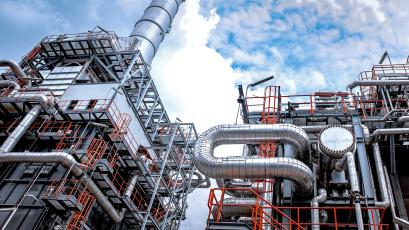WASHINGTON, D.C. — Today, a coalition of 15 energy, agriculture and biofuel groups filed a petition for a writ of certiorari (cert petition) with the Supreme Court of the United States (SCOTUS) challenging EPA’s decision to grant a waiver to the state of California for its 2021-2025 electric vehicle mandate, a policy governing the vehicle choice of nearly 40% of Americans directly and many more indirectly.
Petitioners include the American Fuel & Petrochemical Manufacturers (AFPM), Clean Fuels Development Coalition, Diamond Alternative Energy, LLC, Domestic Energy Producers Alliance (DEPA), Energy Marketers of America (EMA), ICM, Inc., Illinois Corn Growers Association, Iowa Soybean Association, Kansas Corn Growers Association, Michigan Corn Growers Association, Minnesota Soybean Growers Association, Missouri Corn Growers Association, National Association of Convenience Stores (NACS), South Dakota Soybean Association and Valero Renewable Fuels Company, LLC.
The cert petition asks SCOTUS to do two things:
- Review and overturn an April ruling from the DC Circuit, which determined energy petitioners lacked standing, based on redressability, to challenge EPA’s issuance of a federal waiver allowing California to impose its Advanced Clean Cars I (ACCI) EV mandate. In dismissing the petitioners, the DC Circuit failed to consider any merits and statutory questions raised in the petitioners’ case.
- Proceed straight to the merits of the case to clarify that the “California waiver” in the Clean Air Act does not empower any one state to regulate vehicle greenhouse gas emissions, impose electric vehicle mandates or limit consumer access to internal combustion engine technology.
The petitioners offered the following statements on their filing:
American Fuel & Petrochemical Manufacturers (AFPM)
“We are asking the Supreme Court to reverse the D.C. Circuit’s erroneous holding that fuel providers lack ‘standing’ to challenge EPA’s unlawful California waiver, and also to provide long overdue clarity on the authority of EPA and California to mandate electric vehicles. California is not a ‘super state,’ Its Clean Air Act carveout does not give it special privileges to regulate greenhouse gas emissions standards or dictate what types of car and truck powertrains can be sold in this country. Authority of this magnitude rests with Congress.
“The DC Circuit’s opinion—specifically, that fuel providers lack standing to challenge California’s EV mandates because they failed to show that a successful challenge would cause automakers to reduce EV production—is contradicted by legal precedent and basic market economics. The purpose of California’s mandate is to compel automakers and dealers to sell more electric vehicles than the market naturally demands, which is why we’re seeing inventory pile up on many dealer lots. Obviously, removing the mandate would have an effect. With the DC Circuit continuing to use standing dismissals to side-step the issues of this case, it is time for the Supreme Court to weigh in.”
– Chet Thompson, AFPM President and CEO
Boyden Gray PLLC (on behalf of many of the ag. and biofuel petitioners)
“The D.C. Circuit’s decision says that there’s no reason to believe that California’s electric vehicle sales mandate will actually mandate the sale of electric vehicles. That’s obviously false. The reason for the dodge is equally obvious: California’s attempts to become a global climate regulator are legally indefensible. And, as EPA itself admits, despite billions in costs, California’s electrification mandates do nothing at all to reduce global carbon emissions. It is time for the Supreme Court to step in and put an end to this destructive and unlawful experiment in Californian supremacy.”
– Michael Buschbacher, Boyden Gray, PLLC, Partner
Domestic Energy Producers’ Alliance
"We believe the DC Circuit’s April ruling raises significant legal and constitutional questions that need to be addressed by the highest court in the land. The decision to dismiss our standing in this case undermines the voices of numerous stakeholders affected by California’s regulatory overreach. We challenge the EPA's authority to grant California the unprecedented power to regulate vehicle greenhouse gas emissions and enforce EV mandates. This delegation of power not only disrupts the uniformity of national vehicle standards but also sets a concerning precedent for state-by-state environmental regulation. We believe that such significant regulatory decisions should rest with Congress, ensuring a balanced and democratic approach to environmental policy.”
– Jerry Simmons, DEPA President and CEO
Energy Marketers of America (EMA)
“The wheels are already coming off the federal government’s electrification agenda due to skyrocketing utility bills, charging and repair costs, and low consumer interest, and yet, we continue to see the state of California dictating electric vehicle mandates across the country. Therefore, it’s time for the Court to step in to preserve consumer choice and ensure that all forms of energy are treated equally, which will guarantee that small business energy marketers can continue to sell American-made, American-grown fuels in the future.”
– Rob Underwood, EMA President
National Association of Convenience Stores (NACS)
“EPA should not have made California’s vehicle technology mandate a standard across much of the nation. We need innovations to improve all vehicle technologies to fight climate change. Unless the Supreme Court intervenes, this rule will stop a great deal of internal combustion engine innovation in its tracks. The Court should take this case and restore sanity to our system of regulating vehicle emissions.”
– Jeff Lenard, NACS Vice President, Strategic Industry Initiatives
The American Fuel & Petrochemical Manufacturers (AFPM) is the leading trade association representing the makers of the fuels that keep us moving, the petrochemicals that are the essential building blocks for modern life, and the midstream companies that get our feedstocks and products where they need to go. We make the products that make life better, safer and more sustainable — we make progress.


